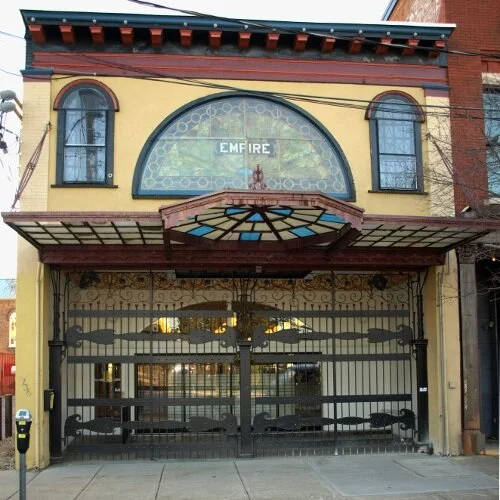Louisville Unearthed: The neighborhood theater that is now Royals Hot Chicken
NuLu’s premiere hot chicken joint once was a penny theater and dates back to the early 1900s. (Courtesy of Royals Hot Chicken)
I was sitting in the lobby of the AC Hotel in NuLu on a recent morning and glanced over at Royals Hot Chicken, with its yawning entrance locked up with the iron gating that gives the space almost a funky steampunk feel.
While it’s now a place to get some delicious Nashville-style chicken, it has in recent years been Taco Punk and Toast on Market. But back in the early 1900s, it began as a “penny theater,” a small neighborhood entertainment business called the Empire Theatre (as evidenced by the ornate stained glass in the upper floor of the building that reads, simply, “Empire”).
There isn’t a lot of history available about the Empire, but Joe Manning wrote in the now-defunct Louisville Paper that in the early 1900s, these types of theaters weren’t welcomed by the traditional stage theaters, which considered moving picture films to be a passing fad which would fade under the popularity of live performance. Oops.
“At a time when carnival barkers were hired to stand on the street,” Manning wrote, “strong arming gentlemen and ladies with parasols into paying 10 cents for a glimpse at the modern marvel of the moving picture show, the Empire Theatre opened its doors for business. While little is recorded about the history of the Empire, it has been established that the Dreamland Theater, which opened on West Market Street in April of 1904, was Louisville’s first electric theater and that six others were in operation by 1908. The Empire, then, opened sometime within that four-year period.”
Not much history remains of the Empire Theatre, but the stained glass facade memorializes it. (Adam Martin Collection)
The Filson Historical Society in recent years found film cards from a pair of local theaters showing RKO films playing in the late 1920s. Some of them were “Street Girl,” a pre-Code musical starring starring Betty Compson; “Rio Rita,” a musical comedy starring Bebe Daniels and John Boles; “Vagaband Lover,” a musical comedy starring Rudy Vallee in his first screen appearance, along with short films starring a young Mickey Rooney.
Listed by CinemaTours.com as a 501-seat theater, the single-screen Empire became the Shelmar Theatre around 1941. A classified ad dated 1942 in the Motion Picture Herald offers evidence that the Shelmar sold off at least part of its equipment. The ad read: “Two Powers projectors complete with RCA soundheads and complete RCA sound system with stage speakers, also two Strong reflector arc lamps and one Wagner motor generator. Make us an offer for quick sale. SHELMAR THEATRE, 736 E. Market. Louisville, Ky.”
CinemaTreasures.org states that the Shelmar “opened as a regular movie theatre prior to 1941 and continued into the 1950s,” which suggests the classified ad was simply about the new owners updating equipment.
Many Louisvillians still remember going to the theater, which one member in the Facebook group Louisville’s Past recalls as being next door to a shoe store and also in close proximity to a business called Tony’s Tavern.
But by the 1960s, the whimsy of the Roaring ’20 had melted into a more turbulent decade that featured conflict here and abroad amidst the Vietnam War. Along the way, the Empire Theatre apparently changed hands, likely more than once, and by the 1960s, it became, as CinemaTreasures.org phrased it, “a burlesque house.”
Shelmar a-go go? (Via CinemaTreasures.org)
One might also call it an adult film theater meets strip club, at least based on a 1960s ad for the business. The ad refers to “Shelmar Follies” and touts a 1962 British Film called “World Without Shame,” about nubile young people who start a nudist colony. Other features of the 1960s version of the Shelmar Theatre included “adult entertainment,” “strip tease” and girls “in naturama,” whatever that was.
According to Manning, no photos exist of the original Empire. He wrote that the theater closed in the 1980s and the building was used as a storage facility for First Link Supermarket, then later as a junk shop until Toast on Market opened in 2006.
So, next time you grab some chicken fingers and waffle fries at Royals, pause a moment to ponder the history of where you are. You may be standing in the same place where a young kid in 1929 watched a musical film or a Rooney short, or in the same spot where a 1960s-era dancer in naturama made an easy buck – possibly off that same kid who had grown up into a bored adult.
Every Friday, Louisville Unearthed will bring you an unusual fact, historical nugget, place, person, etc., that you may not know about our city.
Would you have gone to see this film? If so, you can download it free with an easy Google search.




